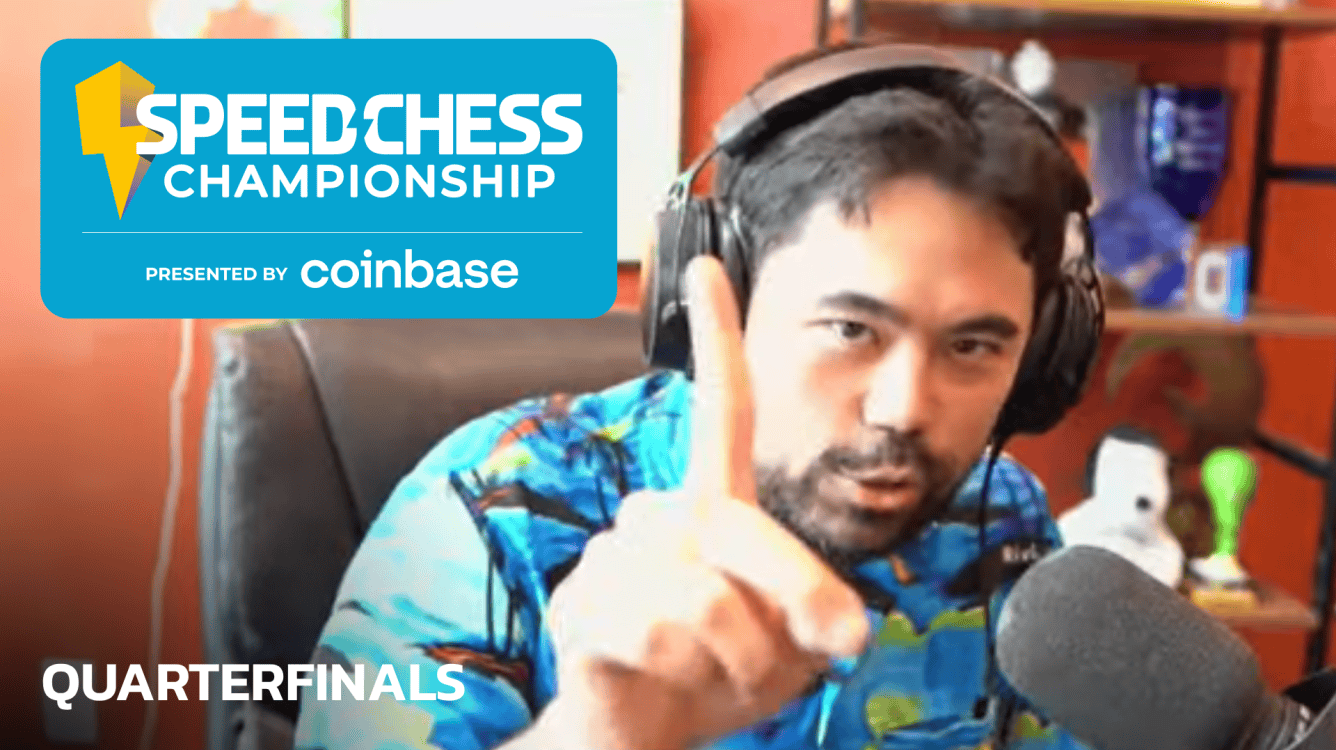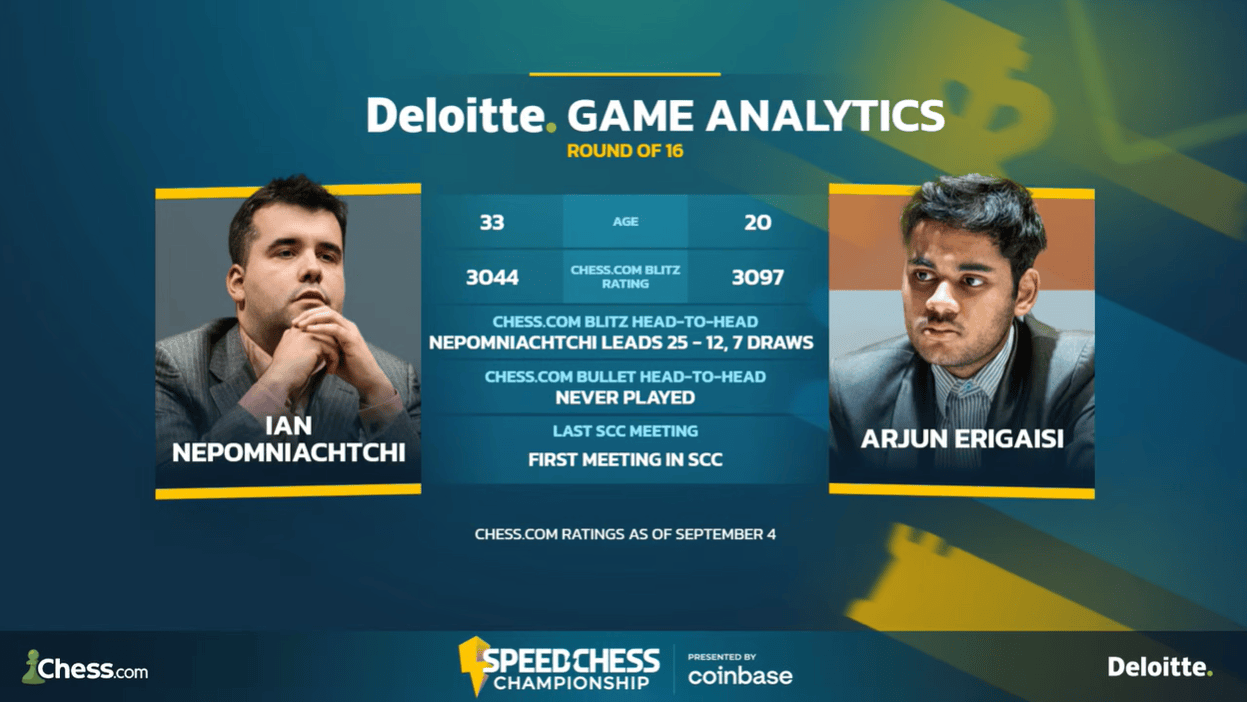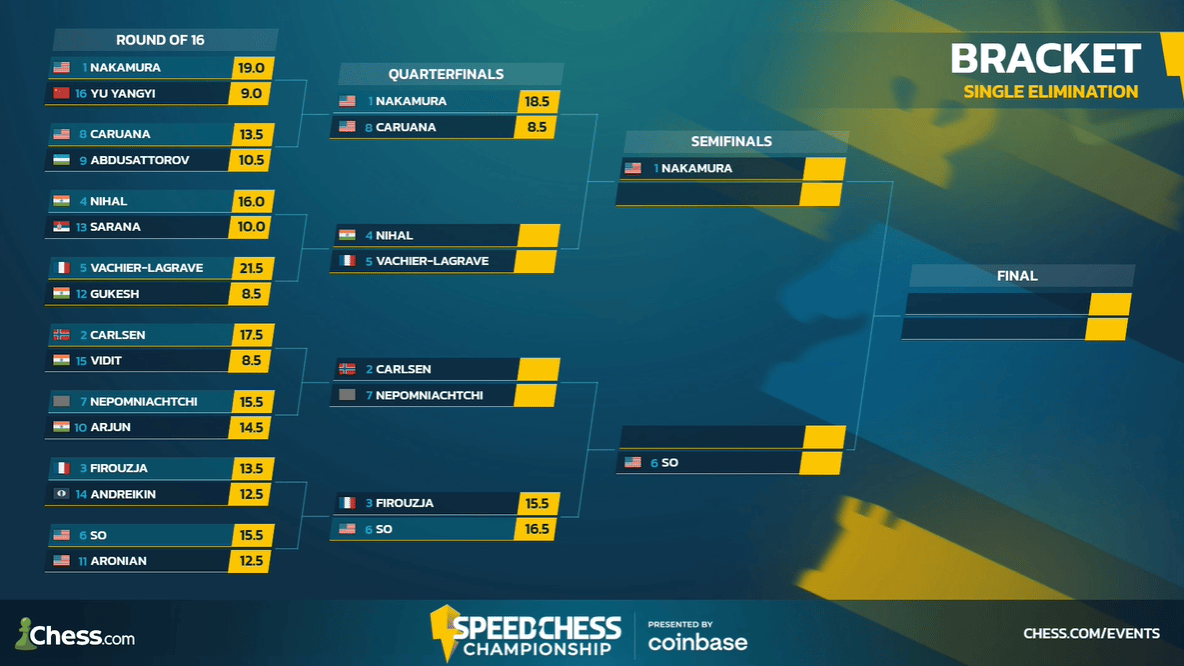
Nakamura Wins With 1.Nh3, Nepomniachtchi Will Play Carlsen
GM Hikaru Nakamura moves on to the Semifinals, while GM Ian Nepomniachtchi is through to the Quarterfinals of the 2023 Chess.com Speed Chess Championship Presented by Coinbase.
Nakamura defeated GM Fabiano Caruana by a 10-point margin, 18.5-8.5, while playing a buffet of unique first moves: 1.c3, 1.h3, and mostly 1.Nh3 with White and 1...a6, 1...h6, and 1...e6 (followed by 2...a6) with Black.
Nepomniachtchi beat GM Arjun Erigaisi by just one point, 15.5-14.5. It was one of the closest matches we've seen, with each player stumbling immediately after taking a one- or two-point lead. They had an even score going into the final bullet game, and the two-time world championship challenger won it with Black.
Although they didn't have a rematch in the classical world championship this year, Nepomniachtchi will have his shot at GM Magnus Carlsen in the Quarterfinals. It seems, after all, this was a rematch the players could only escape for so long.
There will be two matches on Friday, September 15. Carlsen will play Nepomniachtchi starting at 8:30 a.m. ET / 14:30 CEST / 6:00 p.m. IST. Following that, we will see GM Nihal Sarin take on GM Maxime Vachier-Lagrave at 1:00 p.m. ET / 19:00 CEST / 10:30 p.m. IST.
How to watch?
You can watch the 2023 Chess.com Speed Chess Championship Presented by Coinbase on Chess.com/TV. You can also enjoy the show on our Twitch channel and catch all our live broadcasts on YouTube.com/ChesscomLive. Games from the event can be viewed on our events page.
The live broadcast of the first match was hosted by GMs Robert Hess and Benjamin Bok.
The live broadcast of the first match was hosted by GM Daniel Naroditsky and IM Kassa Korley.
Nakamura 18.5-8.5 Caruana | Quarterfinals
Nepomniachtchi 15.5-14.5 Arjun | Round of 16
- 5+1: Nepomniachtchi 5.5-4.5 Arjun
- 3+1: Nepomniachtchi 5.5-5.5 Arjun
- 1+1: Nepomniachtchi 4.5-4.5 Arjun
Nakamura-Caruana
The score on Chess.com between the two American champions was quite evenly matched in blitz. Caruana led their head-to-head by one point, but it was virtually even. Curiously, they hadn't met in the SCC for six years.

After both commentators marveled at Nakamura's peak bullet rating (3570, what?!), Korley aptly summarized the task that befell Caruana in this match: "If Fabiano wants to take this, he's gonna have to do his work early," suggesting that Caruana needed to take the lead in the blitz because he was not exactly the favorite in the bullet segment.

As it went, Nakamura led by three points at the end of the 3+1 blitz segment. From there, we saw the Nakamura bullet train roll once again as he stretched out the margin by another seven points.
5+1: Nakamura 4.5-3.5 Caruana
From his first game, playing 1.c3 in the opening, it was clear that Nakamura's opening bingo series was not over. He was up against one of the world's most prepared players, and so playing offbeat moves from the first move was more likely to be an actual match strategy than a publicity stunt. (It does still make for great content though.)
Caruana won the first game after the five-time SCC champion missed the tactic 30...Rd1!, and the white position crumbled immediately.
Had Caruana been more attentive to mistakes such as this one, and been just as incisive in converting the advantage, he would have had a much higher score later on in the blitz segments. He left too many points on the table later on by missing such wins.
Of course, that is easier said than done!
Nakamura won the next two games in a row to take the lead. Then, in games four and five, we started to see the contours of Caruana's tilt take shape.
In game four, he was absolutely outplaying Nakamura and had every objective and practical chance to win. But then he allowed his knight to get trapped and lost the game. In the clip below, you can see Nakamura look at Caruana's camera in disbelief.
Caruana, just as he has a large advantage, blunders his knight. Nakamura shakes his head like, "You can't do that!"#SpeedChess pic.twitter.com/fsfJSHbDuH
— chess24.com (@chess24com) September 14, 2023
Nakamura then should absolutely have lost game six, where Caruana failed to convert the advantage of two extra pawns. Tragically, the 2018 world championship challenger walked into a threefold repetition by accident.
... and Hikaru saves the draw in a two-pawns-down queen endgame! With a devious smile!#SpeedChess https://t.co/YCQ2rQ8Owl pic.twitter.com/CQVLagmlGx
— chess24.com (@chess24com) September 14, 2023
Caruana nicely won game seven, where even having an extra bishop in the endgame did not make the win easy. It looked like he was losing control with under 10 seconds left, but the reigning U.S. champion sailed through the storm and attained the full point.
With a draw in the last game of the segment, they concluded with the closest score they'd have for the rest of the match.
3+1: Nakamura 5.5-2.5 Caruana
The previous segment was Caruana's best, and it slowly went downhill from there as the time controls became faster. The points he left on the table certainly came back to haunt him, and Nakamura showed no mercy in the games he pressed for victory.
In the first game, they reached a position that Caruana should theoretically never lose. With Black, he had four pawns against a piece. Because White had no pawns left, Black could even blunder all four pawns away and it would still be a draw.
Unfortunately, there were still rooks on the board as well and you can't get away with blundering a rook!
Nakamura was again dead lost in the second game—his king was just a single move away from annihilation. It was another point left on the table and another instance where a win for Caruana may have changed the psychological trend of the match.
In the following position, Korley instantly blurted out the winning move 37.Rxb7, without seeing the engine. Naroditsky later agreed that under normal circumstances, Caruana would have played it instantly—but the psychological trend of the match played a role.
Hesitation crept in, and Nakamura thrived on the indecision. Instead of being checkmated, Nakamura traded queens and escaped into an opposite-colored bishop endgame. Another half-point saved from what we can in good conscience call a dead lost position.
Nakamura won two consecutive games before playing out what is now the longest game in SCC history. It took 204 moves of shuffling in a drawn rook endgame to drain the match clock—as Nakamura explained later, from his perspective, a legitimate match strategy to decrease the number of games in the match when he's ahead.
By the time Nakamura won his fourth and last game in the segment, even Caruana smiled as he dropped a full rook and was suddenly down five points in the match.
Even Caruana smiles as he goes down five points in the match.#SpeedChess pic.twitter.com/4jHzLX5oma
— chess24.com (@chess24com) September 14, 2023
Caruana won the last game of the segment. It was a 25-move miniature and an opening disaster for Nakamura, who was finally punished for playing 1.e4 a6 with the black pieces. But it was still little consolation, as Caruana entered the bullet segment with a four-point deficit.
1+1: Nakamura 8.5-2.5 Caruana
As predicted before the match, the bullet portion of the match was where Nakamura shined most. Out of 11 games, there was one draw.
If one was hoping for a Caruana recovery, the first game was a bad omen. Nakamura still had 57 seconds on his clock after winning, meaning he played the whole game making almost all of his moves in under a second.
Hikaru wins the first bullet game with 57 seconds still on his clock!#SpeedChess pic.twitter.com/qb6wpLsheX
— chess24.com (@chess24com) September 14, 2023
After a draw, Caruana won his first bullet game—with a bishop and outside passed a-pawn against a knight in the endgame.
Nakamura won the next six games. The second game in that streak was, in one sense, the most crushing because Caruana found a great (and winning) tactic with 18.Bh6!. But after Nakamura's 18...g6, he played the natural 19.Bxf8, missing the strong response 19...gxf5! with tempo.
In a span of two moves, White went from having a winning attack to losing material:
Caruana's only other win came in the last game, but the match had been finished for quite a while already.
In the interview, Nakamura shared some interesting insights. Asked about his—how shall we say—unique opening choices, he reminded us that he's not the only one to play like this: "There's a certain former world champion who does the same thing, maybe not as often," hinting at Carlsen who plays all sorts of adventurous first moves in Titled Tuesdays.
He also shared that he stuck with 1.Nh3, instead of 1.c3—which he only played one time—because he was "worried" Caruana may have spoken to GM Levon Aronian during a break "and come up with something to do against it."
Oh, and who's the best bullet chess player besides Carlsen and Nakamura? He says Nihal is a contender, but "without a doubt" GM Ding Liren.
Who is the best bullet player in the world besides Hikaru Nakamura and Magnus Carlsen?
— chess24.com (@chess24com) September 14, 2023
"Ding was by far and away the best player in the 1+1 that I've faced outside of Magnus Carlsen, without a doubt."#SpeedChess pic.twitter.com/y63Gl3UDp7
Nakamura earns $6,740.70 and Caruana makes $1,259.30 by win percentage. In the Semifinals, Nakamura will play the winner of Vachier-Lagrave vs. Nihal.
All Games | Nakamura vs. Caruana | Quarterfinals
Nepomniachtchi-Arjun
The two-time world championship challenger was not originally one of the 16 players in this year's SCC, but he was a last-minute replacement after Ding's last-minute withdrawal from the event.
A few weeks ago, Nepomniachtchi, with a post on social media, showed he was feeling a bit left out. Just as Ding was a last-minute replacement in the 2022 Candidates Tournament—and, in a sense, in the 2023 world championship (for Carlsen)—we see the tables have turned.
I’m simply not good enough 🤷🏻♂️ https://t.co/SC7Q6ZRf9M
— Ian Nepomniachtchi (@lachesisq) August 29, 2023
Since then, his recent tournament victories have been quite a statement. He won Division II of the Julius Baer Generation Cup two weeks ago. This week, he won the early Titled Tuesday. His match victory over Arjun on Thursday was perhaps another statement: Carlsen, you're next.
Nepomniachtchi led the head-to-head encounters with Arjun on Chess.com by more than double Arjun's score.

20-year-old Arjun, the Indian number-five, won the 2022 Junior Speed Chess Championship. Nepomniachtchi was predicted to be the favorite, although juniors are always improving and can be unpredictable, as we saw in this match.
SmarterChess predicted a slight advantage for the world number-six in the two blitz time controls. It was sort of correct; Nepomniachtchi only won the 5+1 segment by one point, and the other two were tied in score.

5+1: Nepomniachtchi 5.5-4.5 Arjun
The first segment was a seesaw of momentum—a statement that would actually describe the entire match. Arjun took an early lead, but after a close struggle, Nepomniachtchi finished the segment ahead by one point.
Nepomniachtchi won the first game after his speedy play—having nearly two minutes against 30 seconds—provoked a decisive mistake. One game later, though, he laughed and took a sip of tea as he resigned on move 13.
Arjun took a one-point lead in the next game, but it didn't last; one erroneous decision instantly shortened the life span of his king:
"What was that!?"
— chess24.com (@chess24com) September 14, 2023
Arjun could have taken Nepo's queen with a level position, but he moved his king away and resigned a move later! #SpeedChess pic.twitter.com/NR5pF86hy7
Arjun then lost on time in a position where he had a winning advantage, but after a draw, he brought the score back to the balance by using two minor pieces to outplay a rook in the endgame.
The last game allowed the Russian number-one to take a one-point lead before the next segment. With Black, he played the thematic break in the center, 29...d5!, followed by 31...fxg4! sacrificing the exchange. Although Arjun tried his best to confuse the situation, Black broke through without any delay.
3+1: Nepomniachtchi 5.5-5.5 Arjun
A significant lead (of more than two points) remained elusive for both players for the rest of the match. Just as one won a game or two, the other would return the favor. They made a draw in the first game, but the next 10 were decisive.
The first four of those decisive games were black wins, alternating between each player. The very first win for Nepomniachtchi in this segment was a shocking one. Arjun grabbed an undefended knight in the center of the board—as if, to pick up a dollar bill, running onto train tracks. Nepomniachtchi played the last move of the game with a sinister grin:
Back and forth they went. Nepomniachtchi had just taken a two-point lead by winning the fourth of those consecutive black wins, but then he disconnected and lost on time. Arjun won the next game with the white pieces, the first of four consecutive white wins.
In that game, the Indian prodigy first found the knife-like 25.Bd5! to begin the king hunt. He chased the black king from the kingside all the way across the board to b7.
One more beautiful game was Nepomniachtchi's last victory with the white pieces. He sacrificed the exchange for total control with the dark-squared bishop; in reality, it can hardly be called a sacrifice. The bishops, raking across the chessboard in the final position, are a sight to behold.
GM Rafael Leitao breaks down the details from start to finish in the annotations below.
The last two games ended with a black win for each player, including a dramatic finish that went in Nepomniachtchi's favor.
With 23.Qh4?? Arjun, behind the white pieces, created a mate-in-one threat. Both players were ready to deliver checkmate. And yet it was Black's turn.
That meant the 3+1 segment of the match ended in a tied score—meaning Nepomniachtchi was up by only one point heading into the bullet games.
1+1: Nepomniachtchi 4.5-4.5 Arjun
Another hard-fought segment decided the match only in the final game, which Nepomniachtchi won. We were a game away from entering the second overtime this season.
After two draws, Arjun broke the ice by winning three consecutive games and taking a two-point lead. He won a piece in the first game, won on time in the second, and he found some nice geometry to win the third.
LPDO means Loose Pieces Drop Off. This concept was quite relevant in that third game, where an undefended rook left the board:
And then, true to the way this match had been going, Nepomniachtchi won two in a row himself to even the score.
Then came a draw. There was one bullet game left. A single win here meant winning the match, and a draw would take us to overtime. The game turned on the position after Nepomniachtchi's 26...h5.
Nepomniachtchi takes home $4,550 for winning the match and Arjun receives $1,450 by win percentage.
Bracket

All Games | Nepomniachtchi vs. Arjun | Round of 16
The main event of the 2023 Speed Chess Championship Presented by Coinbase takes place September 4-22. It is the strongest online speed chess contest in the world, with 16 players—12 invited and four qualifiers—vying for a share of the $150,000 prize fund along with one of the most prestigious titles in online chess.
Previous coverage
- Wesley So Triumphs In Armageddon, Wins Season's Longest Match
- Vachier-Lagrave Blitzes Gukesh; Carlsen Defeats Vidit
- Caruana Reaches Quarterfinals Match Vs. Nakamura, Knocks Out Abdusattorov
- Firouzja Underpromotes Pawn To Knight In Last Game To Win By 1 Point
- Nihal Beats Sarana, Wins All 3 Segments With 16-10 Final Score
- Wesley So Eliminates Aronian After Starting With 5-Game Winning Streak
- Nakamura Plays Opening Bingo To Beat Yu
- Andreikin Mounts Spectacular Comeback, Qualifies With Sarana
- Armageddon Wins In Both Finals: Vidit, Yu Qualify For SCC 2023 Presented By Coinbase
- Nakamura And Carlsen's Rivalry Returns For 2023 Speed Chess Championship Presented By Coinbase


